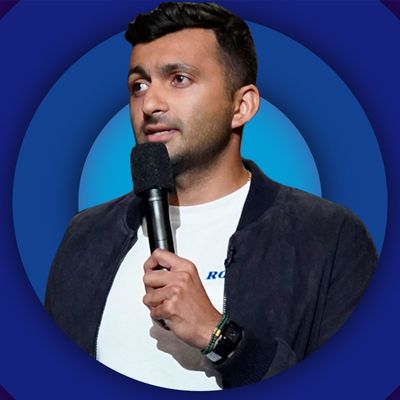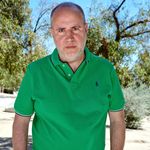
Ten or 15 years ago, before what one might call the Second Comedy Boom, it was really, really rare for comedians to play theaters. At a given time, there might have been four or five theater acts, often the result of decades of touring and big Hollywood breaks. But now, the upcoming schedules of the Town Hall in New York, the Wilbur Theatre in Boston, and the Warner Theatre in D.C. may be lousy with comedians, many of whom got there without any mainstream exposure. For some, they got there through podcasting or YouTube. For Nimesh Patel, it was TikTok.
After joining the app two months into the quarantine, Patel amassed over 1 million followers. That’s all thanks to posting clips from his IRL stand-up, including early versions of jokes that eventually wound up on his June YouTube special, Thank You China. On Good One, Patel talks about his rise on TikTok, the unexpected makeup of his new audience, and how he balances his own tastes with what the algorithm likes. You can listen to the full episode below, and tune in to Good One every Thursday wherever you get your podcasts.
Good One
Subscribe on:
So the special is called Thank You China, which is referring to the influence TikTok has had on building an audience for you. Your rise on this platform has been incredible. You joined in May 2020, two months into COVID, right?
March 2020, when everything shut down, was a wild time for live performance. I was thinking, All right, I gotta figure out this unemployment form. What am I going to do? The first jokes from my special were from quarantine. I don’t remember exactly when I put them up, but they started doing well at the beginning of quarantine. Then I realized, Oh, people are just online right now, stuck at home doing stuff. As far as I knew, people were still like, What the fuck is TikTok? My wife, who works in social media and in the influencer space, was the first person to tell me to put myself on there. I didn’t get the platform, so my first video was me doing a very goofy cover of Kanye’s “Jesus Is Lord” song, and it didn’t really do anything. I was like, Okay, is this what it’s for? Then my wife said, “No, you should just put stand-up stuff out.”
The first stand-up clip that I put out, I think it was an Indian joke about Indian cops. It did, like, crazy numbers, like 3- or 400,000 views. Lucky for me, having been at the Comedy Cellar for four years already, they record all the clips and send them to the comedians. So I had this whole catalogue of clips that I could just chop up and put out; I started feeding the algorithm, just putting clips up daily and slowly building an audience.
In March 2020, did you ever think, I’ll be a theater act real soon? What is it like to be at this tier?
In March 2021, I had only one date on my calendar. By May 2021, I was booked for the year. It was very clear what my trajectory was. Even if I stayed only doing clubs the way I did all last year, I’d feel like I made it as a comic. I always knew when I started that the dream was to be doing these big-ass venues, but actually doing this is crazy.
In the mixtape you released before the special, you start by asking if this is anyone’s first stand-up show, and a bunch of people say it is. How do you do material for people who don’t know the rules and create in them an understanding of what a comedy show can be like?
It’s such a fun responsibility because I know that I will deliver to them what I think stand-up should be. I obviously joke, “What if I ruin comedy for you?” It’s a fun thing to be people’s first live stand-up comedian that they’ve ever seen. The first live comedian I ever saw, I was 20 years old at NYU, getting pizza after studying for finals. I went to the Comedy Cellar, I walk in, Chappelle’s onstage. The first comedian I ever saw live was Dave Chappelle. He made fun of me while I walked in because I had a backpack on. He’s like, “Your skin’s a little too … I’ll want to check your bag.” And now I’m the first comedian some other impressionable 20-year-old is ever going to see. That’s crazy.
Do you have to do any hand-holding?
No. One of my biggest bits that went kind of viral was me talking to some heckler at the Comedy Cellar. I said, “Look, anything I ask you, your answer doesn’t matter. It’s just the pivot point for whatever I want to talk about. I’m just good at making it seem like a conversation. But we’re not really having a conversation. I know where to go.” I try to do some version of that at the shows just so people know the tone.
I will hand-hold if I need to, but it’s more like, Look, I start five, ten minutes with some fairly dark, touchy stuff. This is what comedy is to me. These are my jokes. If you’re not okay with it, there’s no refunds. But trust me, you’ll have a good time like this. I’m not here to hurt your feelings or anything like that. If your feelings are hurt, again, I already have your money. So just enjoy it and have a good time.
You laugh at your own jokes a lot. There was a comment on a YouTube video where someone was like, “The person that has the most fun at a Nimesh Patel show is Nimesh Patel.” You clearly care about the audience and want to have some sort of communal experience, but how important is the audience to you?
I won’t lie and say “fuck the audience.” I love the audience. I’m there for them as much as they are for me. But a lot of the jokes I just need to say because they’re funny to me; I’ve told that joke, and I have laughed at that joke so many times that it just happens naturally now. Like, Oh, I’ve said it. Let me laugh at it. There’s a few jokes where I’m laughing because the audience is laughing, where I cannot believe I got to say this to this crowd and that they are laughing at this ridiculous thing that I just said. I’m up there having a good time.
How do you feel about the fact that you’re essentially allowing parts of your act to be removed from its context and be put in this sort of void on TikTok?
My most recent clip received a lot of angry comments and vitriol. I said that Will Smith is a bitch-ass and alopecia is barely a real disease. Out of context, people are like, “Where’s the joke?” Well, if you were at the show, you would understand because it’s 45 minutes of buildup before I say that. I will not hesitate to say that I feel a little bit like Rupert Murdoch sometimes. I’m trying hard not to be evil about it; the only manipulation I’m trying to do is try to get people to come see me at the show. One of the flaws of my approach on TikTok has been that a lot of my stand-up that’s there right now is very different from what I’m talking about onstage. It is a world of difference.
I won’t relitigate the whole Columbia situation, but between that and having blown up on TikTok, what do you feel like you have learned about young audiences?
I don’t think I’ve learned anything about young people. It just reaffirmed my belief that the youth are a fickle group that don’t necessarily know what’s going on and how quick they are to snap to judgment. But when I look back at the Columbia incident, I no longer think about the behavior of those students or the organization that kicked me off or anything. I just think about how I could have been a lot funnier in my reaction. I give myself like a C, C-plus on the show itself. Had I been just fucking killing the audience, the organization would have never had the gumption to come up onstage and kick me out. And that’s all I think about now. I don’t pay any attention to the 20-year-old minds that did what they did, because now I’m seeing that the shows where 20-year-olds come out and have a good time and — they’re having fun, and they want to laugh.
More From This Series
- How to Turn a Comedy Podcast Into a Comedy Documentary
- This Is Judd
- Ramy Youssef on the First Israel-Palestine Joke He Wrote After 10/7





